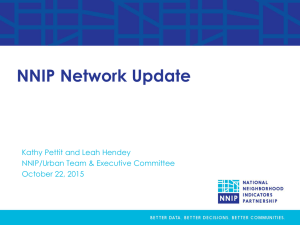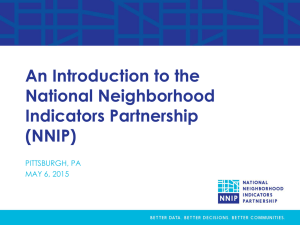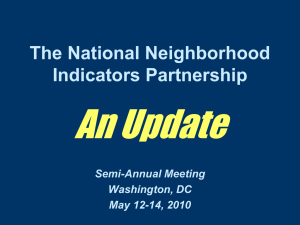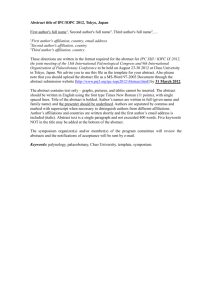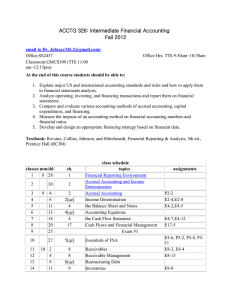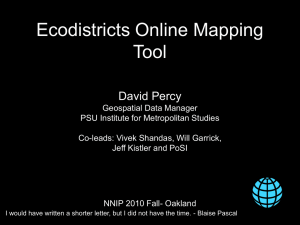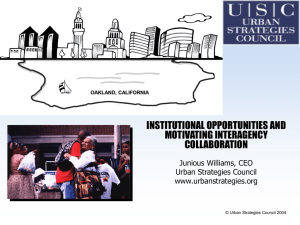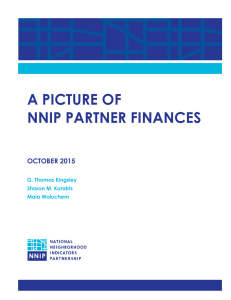DOCX - National Neighborhood Indicators Partnership
advertisement
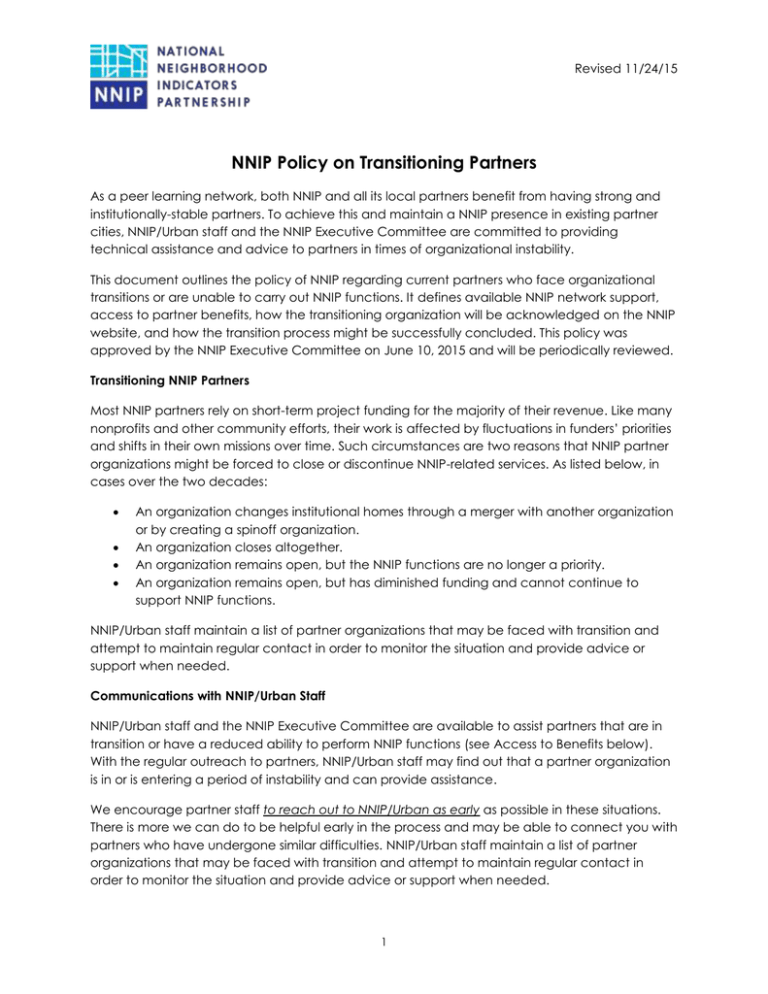
Revised 11/24/15 NNIP Policy on Transitioning Partners As a peer learning network, both NNIP and all its local partners benefit from having strong and institutionally-stable partners. To achieve this and maintain a NNIP presence in existing partner cities, NNIP/Urban staff and the NNIP Executive Committee are committed to providing technical assistance and advice to partners in times of organizational instability. This document outlines the policy of NNIP regarding current partners who face organizational transitions or are unable to carry out NNIP functions. It defines available NNIP network support, access to partner benefits, how the transitioning organization will be acknowledged on the NNIP website, and how the transition process might be successfully concluded. This policy was approved by the NNIP Executive Committee on June 10, 2015 and will be periodically reviewed. Transitioning NNIP Partners Most NNIP partners rely on short-term project funding for the majority of their revenue. Like many nonprofits and other community efforts, their work is affected by fluctuations in funders’ priorities and shifts in their own missions over time. Such circumstances are two reasons that NNIP partner organizations might be forced to close or discontinue NNIP-related services. As listed below, in cases over the two decades: An organization changes institutional homes through a merger with another organization or by creating a spinoff organization. An organization closes altogether. An organization remains open, but the NNIP functions are no longer a priority. An organization remains open, but has diminished funding and cannot continue to support NNIP functions. NNIP/Urban staff maintain a list of partner organizations that may be faced with transition and attempt to maintain regular contact in order to monitor the situation and provide advice or support when needed. Communications with NNIP/Urban Staff NNIP/Urban staff and the NNIP Executive Committee are available to assist partners that are in transition or have a reduced ability to perform NNIP functions (see Access to Benefits below). With the regular outreach to partners, NNIP/Urban staff may find out that a partner organization is in or is entering a period of instability and can provide assistance. We encourage partner staff to reach out to NNIP/Urban as early as possible in these situations. There is more we can do to be helpful early in the process and may be able to connect you with partners who have undergone similar difficulties. NNIP/Urban staff maintain a list of partner organizations that may be faced with transition and attempt to maintain regular contact in order to monitor the situation and provide advice or support when needed. 1 Access to NNIP Partner Benefits during Transition When an NNIP partner organization closes or ceases to provide data-related services, access to partner benefits (such as the NNIP partnership meetings, email lists and voting for the Executive Committee) will be determined on a case-by-case basis by NNIP/Urban staff in consultation with the NNIP Executive Committee. Part of the services provided by the NNIP network by Urban Institute staff is to assist local stakeholders as they identify the options for moving forward, including advising them as they gather support for the need for NNIP functions and identify a new potential home. Within the constraints of the current funding, NNIP/Urban staff will provide support to former partner staff who are actively working to rebuild their capacity to provide data or to transfer responsibility of the functions to another organization. These individuals can maintain access to the website and various communication outlets and are welcome at the partner meetings. NNIP/Urban staff can also invite individual staff of the former partner organizations who meet the criteria to join the NNIP Alumni Network. Acknowledgment on the NNIP Website The circumstances of the transition and the engagement by the partner organization staff will determine whether the partner organization will remain listed as such on the NNIP website. If there is no local stakeholder working to reorganize, NNIP/Urban staff will un-publish the organization/city as a partner on the website. Previous publications and activities will remain on the site with credit to the previous partner organization. If there is former staff or a local stakeholder actively working to reorganize, NNIP/Urban staff will consult with the person to determine whether it is advantageous to the local process to keep the city/organization listed on the site or not. To remain listed on the site, an individual must be identified who is willing and able to serve as the contact for their area for any inquiries through the site. If the city/organization remains listed, a note will also be added to the description acknowledging the transition. Completing the Transition With support from NNIP and Urban staff, we hope that NNIP partner organizations in transition will be able to find new funding support or identify a new institutional home for NNIP functions. If the local stakeholders transfer the NNIP functions to another organization, we will require the new organization to go through the standard formal application process and respond to an additional set of questions about the transition. If the leadership, staff and mission do not change and just the organizational home changes through a merger or wholesale transfer of functions, NNIP/Urban staff and the Executive Committee can waive the need for the application process. If new revenue is raised to support the re-activation of NNIP functions at the existing partner organization and leadership, staff and mission have not changed, no reapplication is required. 2 Successful Transitions The table below lists the successful transitions for local NNIP partners. While not all transitions necessitated the involvement of NNIP/Urban staff, in several cases they played a significant role, including providing strategic advice to partner staff, conducting scans of the local information ecosystem, and traveling to make presentations in those cities on the benefits of NNIP. City Atlanta Baltimore Dallas Detroit Miami New Orleans Milwaukee Washington, DC Outcome Transferred from Georgia Tech to NeighborhoodNexus, a consortium of the Atlanta Regional Council and Emory University with the community foundation as the fiscal agent Transferred from an informal network to the University of Baltimore Transferred from Foundation for Community Empowerment to the Institute for Urban Studies at the University of Texas-Dallas Nonprofit Data Driven Detroit became an affiliate of the Michigan Nonprofit Association Transferred from a government agency to the Children’s Trust Changed from being a program of the Center for Nonprofit Resources to an independent nonprofit Transferred from Nonprofit Center of Milwaukee to IMPACT, Inc. (another local nonprofit) Transferred from nonprofit DC Agenda to the Urban Institute Transition-Related Links An asterisk notes a document restricted to NNIP partners and registered users. Organizational Planning Resources Exploring the Future for the Baltimore Neighborhood Indicators Alliance (2005)* An Assessment of the Community Information Infrastructure in the Chicago Metropolitan Area (2013) Chicago School of Data, an “ecosystem project” (2014) Assessment of Need and Opportunities for Data Intermediary Services in the Hartford Capital Region (2014) Application of IMPACT, Inc. to the NNIP partnership transitioning from the Nonprofit Center for Milwaukee (2015) 3
